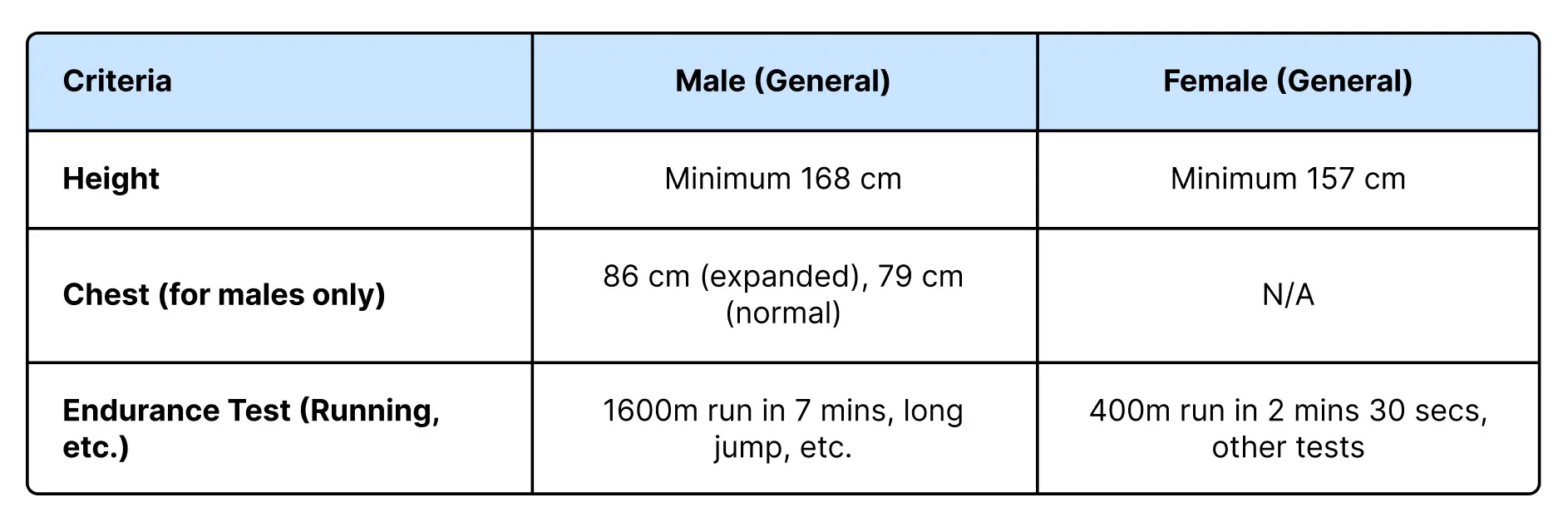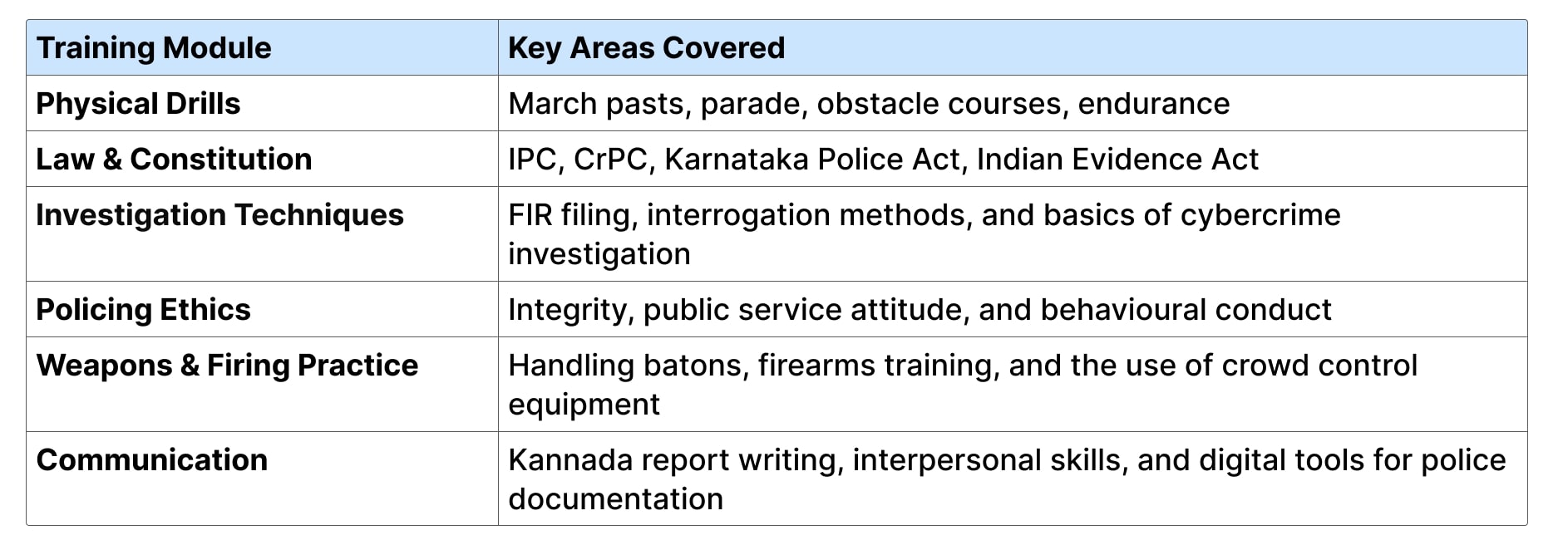July 28, 2025

If you’re dreaming of a career as a Police Sub‑Inspector in Karnataka, you’ll need more than ambition; you’ll need strategy. With limited PSI exam seats up for grabs in the latest KSP recruitment cycle, competition is fierce.
Passing the PSI exams demands more than hard work: you need clear knowledge of eligibility rules, exam patterns, physical standards, and preparation steps. Anyone from first-time test‑takers to repeaters can benefit from a structured roadmap.
This blog walks you through every stage, from application and physical tests to written exams, interviews, and final placement, so you can confidently plan your path to success.

The PSI exams (Police Sub-Inspector exams) are competitive recruitment tests conducted to select candidates for sub-inspector positions in Karnataka’s law enforcement departments.
Organised by the Karnataka State Police or the Karnataka Examination Authority (KEA), these exams aim to identify individuals with the physical stamina, mental sharpness, and ethical mindset needed to serve as front-line officers.
The PSI role is about leadership and public trust. Selected candidates are tasked with maintaining law and order, preventing crime, supervising police constables, and managing station-level operations. It’s a respected post that opens doors to promotions as Inspector, Deputy Superintendent of Police (DSP), and beyond.
The Karnataka State Police conducts various types of PSI exams based on department needs and recruitment channels. Here’s a clear breakdown:

Each role demands a mix of discipline, field-readiness, and decision-making skills, which are qualities ICS Institute helps aspirants develop through targeted training and mentorship.
The eligibility criteria for PSI exams in Karnataka are defined by the Karnataka Examination Authority (KEA) or the Karnataka State Police Department, depending on the recruitment cycle. These rules ensure only the most capable and qualified candidates move ahead in the selection process.
Always check the latest notification for exact age limits and category-specific relaxations.
To qualify, candidates must meet both endurance and physical measurement standards:

ET and PST are qualifying in nature, but must be passed to advance to the written stage.
Looking for expert guidance for the PSI Exam? ICS Institute for Competitive Examinations, Dharwad, is a trusted name in police recruitment coaching. With experienced trainers, updated PSI-specific study material, and a strong success record in both physical and written stages, ICS gives you the competitive edge you need to succeed.
To apply for the PSI exams, candidates must register on:
Which portal is used depends on the recruiting authority for that particular year. Only applications submitted through these official portals are considered valid.
Remember to mark these dates early, set reminders, and double-check the official portal often for updates.
The PSI written test is held in two papers, each lasting 90 minutes:

Negative marking: 0.25 marks deducted per wrong answer in Paper II
PSI Exam Syllabus
The main topics covered include:
ICS Institute’s exclusive study materials and bilingual coaching sessions ensure students thoroughly cover each topic, whether it's numerical aptitude, essay writing, or Karnataka-specific current affairs.
To move past the written stage, candidates must score above the official cutoff marks, which are declared after each exam cycle. These cutoffs vary depending on:

Note: Paper I (Descriptive) is also evaluated but often treated as qualifying in nature. However, poor performance here can affect the final merit score.
The cutoff score is just the minimum qualifying mark; therefore, aim higher to secure your spot in the next stage, especially since the total vacancies (615) are limited and competition is intense.
Aiming to become a Police Sub-Inspector? Get a head start with ICS Institute, offering dedicated training for physical tests, expert-guided classes for the written exam, and personalised interview prep to help you clear every stage with ease.
Also Read: Best PSI Exam Classes in Haveri
Practical Tips to Prepare for the PSI Exam
Since the PSI exam is conducted in stages (Physical Tests, Written Exam, and Interview), your preparation must address both physical and academic requirements. Discipline, regular practice, and clarity of syllabus are key to clearing all rounds.
Here are some practical, field-tested tips to help you plan smart and prepare better:
Understand the three major components:
Read the official syllabus carefully. Break it down by paper and topic, especially GK, essay writing, and reasoning.
Make a weekly schedule covering:
Include at least one rest day to avoid burnout.
Your first hurdle is the endurance test. Start running, jumping, and strength exercises at least 3–4 months before the test.
Track your daily progress and follow a healthy diet for fitness and stamina.
Many candidates come from Kannada-medium backgrounds. Use bilingual notes, Kannada essay books, and translated current affairs compilations.
Stick to reliable sources, and don’t overload with too many books.
Paper 1 involves essay writing, precise writing, and translation (English to Kannada).
Write 2 essays per week and get them reviewed. Time yourself while practising.
Start with sectional tests and then move to full-length mocks.
Analyse where you're losing marks, like accuracy, time, or concept clarity and improve accordingly.
Read Kannada or English newspapers regularly. Focus on:
Make daily notes and revise weekly.
Don’t wait till the written exam is over. Practice:
Mock interviews help improve your presence and communication.
Also Read: Best Coaching Classes In Dharwad For Competitive Exams

Once candidates clear the Viva Voce, they must undergo a comprehensive medical examination conducted by a government-certified medical board. This step ensures you are physically and medically fit for the duties of a Police Sub-Inspector.
Key Assessments Include:
Before final selection, candidates must present original documents for verification. This process is strict and crucial.
Required Documents:
Any document mismatch, forgery, or missing certificate can result in immediate disqualification.
Candidates who clear all previous stages are admitted into police training at a designated state-run police academy, usually the Karnataka Police Academy, Mysuru or similar training centres.
Duration: 6 to 9 months (full-time residential program)
Training Curriculum Includes:

Trainees are also exposed to simulated fieldwork and mock situations.
After completing training, new PSI recruits are placed on probation for 2 years under the supervision of senior officers.
During probation:
Consistent discipline and strong ethics are vital to pass this phase successfully.
After probation, officers receive their first permanent posting. Most are assigned to:
Over time, you can climb the ranks through:
The career growth path for a Police Sub-Inspector typically progresses from Sub-Inspector to Inspector, then to Deputy Superintendent of Police (DSP), and eventually to Superintendent of Police (SP) through promotions and departmental exams.

Clearing the PSI Exams requires more than just physical fitness; it takes strategy, clarity on the syllabus, and focused preparation across all stages. With limited vacancies and high competition, now is the perfect time to start preparing seriously.
ICS Institute for Competitive Examinations, Dharwad, offers specialised PSI coaching with expert-led physical training, bilingual classes, mock tests, and complete support for endurance tests, written papers, and interviews.
With a proven record of success in North Karnataka, ICS helps you stay disciplined, exam-ready, and ahead of the curve at every step of the PSI selection process.
Not seeing progress in your PSI exam prep? Join ICS Institute, Dharwad. Get expert guidance, physical test prep, and full exam support. Begin your journey to become a PSI with ICS today.
1. How to prepare for a PSI exam?
Start early with physical training, cover the syllabus using standard books, practice essay writing in Kannada, and take regular mock tests. Focus equally on fitness, current affairs, and reasoning. Join a coaching centre if you need structured guidance.
2. What is the qualification for the PSI exam?
Candidates must hold a Bachelor’s degree from a recognised university. Final-year students are not eligible unless they’ve completed the degree before document verification. Physical fitness and age criteria must also be met as per the official notification.
3. Is the PSI exam difficult?
Yes, it is moderately difficult due to limited vacancies and high competition. Success requires consistent physical and academic preparation, good Kannada writing skills, and awareness of current affairs and law-related topics. A clear strategy makes it manageable.
4. How many attempts are there for the PSI exam?
There’s no official limit on the number of attempts. However, you can only apply if you fall within the prescribed age limit, which varies by category (General: 28 years, OBC: 31 years, SC/ST: 33 years, Ex-servicemen: up to 45).
Boost Your Confidence & Competitive Skills